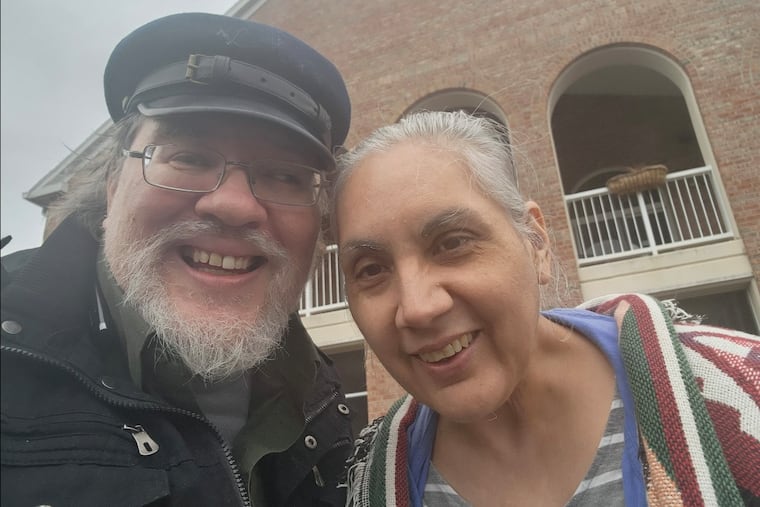My wife’s dementia started in her 40s. And our medical system failed her.
It pains me to think how long it took for doctors to take us seriously. More doctors need to be aware of the early signs of dementia in younger patients, particularly in our area.

In August 2015, my wife Dora came home and said that she had an incident while driving. She had stopped at an intersection and suddenly couldn’t remember where she was going.
A year later, after she had experienced several other strange episodes, she told me what really happened that day in August. One minute she was driving, and then the next, she blacked out and woke up on someone’s lawn while the car was idling on the sidewalk. She managed to get up and drive home. She was worried that if she told me the truth the day it happened, I’d be scared. She was right.
By then, we had been accustomed to smaller mental health episodes for more than a decade. The first odd moments came in 2004, when Dora would sometimes act like a baby, or suddenly lose (and later regain) her ability to talk. It’s just stress, the doctors told us. Besides, Dora was 40 then; she was too young to have dementia, they said.
I thought so, too. Dora was one of the healthiest people I knew, and since I met her, she could light up a room with her charisma and enthusiasm. We met in the Navy in 1990 on an exercise hunting for submarines, and when we got married a year later, we became coconspirators, partners in everything — business, church, and the military. She was up for any adventure, and when I’d accompany her to meetings or conferences, people would look me over as if to say, “A woman this great married you?”
But after the 2015 episode, it was clear that Dora was experiencing far more than stress or anxiety. She couldn’t focus and had to quit her job.
Doctor after doctor minimized her symptoms. Try to calm down, they told her.
“Doctor after doctor minimized her symptoms.”
In the absence of any formal diagnosis, I started doing my own research. Several months later, I took her to see a neurologist. I thought Dora might have early-onset Alzheimer’s. The neurologist was skeptical — again, Dora was too young — but he agreed to order an MRI and a PET scan that would reveal what was happening in Dora’s brain. Finally, I thought: A PET scan can identify the signs of Alzheimer’s years before symptoms appear; maybe this would tell us what was happening and let us get ahead of it.
But when we arrived on the morning of the scans, a nurse said that our private insurance refused to pay for the tests. We were unable to afford the cost out of pocket, so the scans were canceled.
The memory of this infuriates me. But it’s a scenario that happens every day in America.
By September 2020, Dora’s condition was going downhill. Her episodes had gotten worse and more frequent. She turned mean and incoherent, often staying up for days yelling at invisible people or accusing me of outlandish things. She occasionally wandered off. Our entire town knew to look out for Dora and call me if they saw her wandering.
Meanwhile, I was struggling, too. I could hardly sleep. My business was collapsing. I was constantly worried about her.
A few months later, while we were in the kitchen, Dora became belligerent and grabbed a knife to stab me. I turned on my phone camera while she raged at me. Then I called 911. The police took Dora, and I nearly collapsed with exhaustion.
Finally, we got the help we had spent years asking for. She was taken to the University of Pittsburgh Medical Center, where she was given extensive tests for Alzheimer’s. The bill was almost $100,000.
The tests came back as I feared. Dora had late-stage Alzheimer’s. She was 56.
» READ MORE: Dementia, Alzheimer’s have reached crisis point, Penn researcher says. Here’s what we can do about it.
Dora, now 57, is taking medication I pay for out of pocket, and appears more coherent. It pains me to think how long it took for doctors to take us seriously, to see what was obvious to us. More doctors need to be aware of the early signs of dementia, and not write them off in younger patients, particularly in our area. A 2020 report from Blue Cross Blue Shield found that rates of early-onset dementia (in patients as young as 30) tripled between 2013 and 2017, and Pennsylvania and New Jersey were among the most affected states.
There is no cure for Alzheimer’s, but if Dora had gotten a diagnosis earlier, we could have at least known what was happening, gotten some help, and tried to slow the disease. Perhaps she would still be next to me, not living in memory care.
The stigma of Alzheimer’s tends to fill people with embarrassment and shame. But in Dora’s case, finally knowing what is wrong, she has found peace. In her clear-minded moments, we pray together and talk about the future. In one of these moments recently, she asked me to write our story and share it to ensure others don’t have to go through what she did. That’s one thing that never changed about Dora: using her experience, even if it was bad, to help someone else.
William Collier is a principal at Intellz, a strategic digital services firm. He lives in Blossburg, Tioga County.